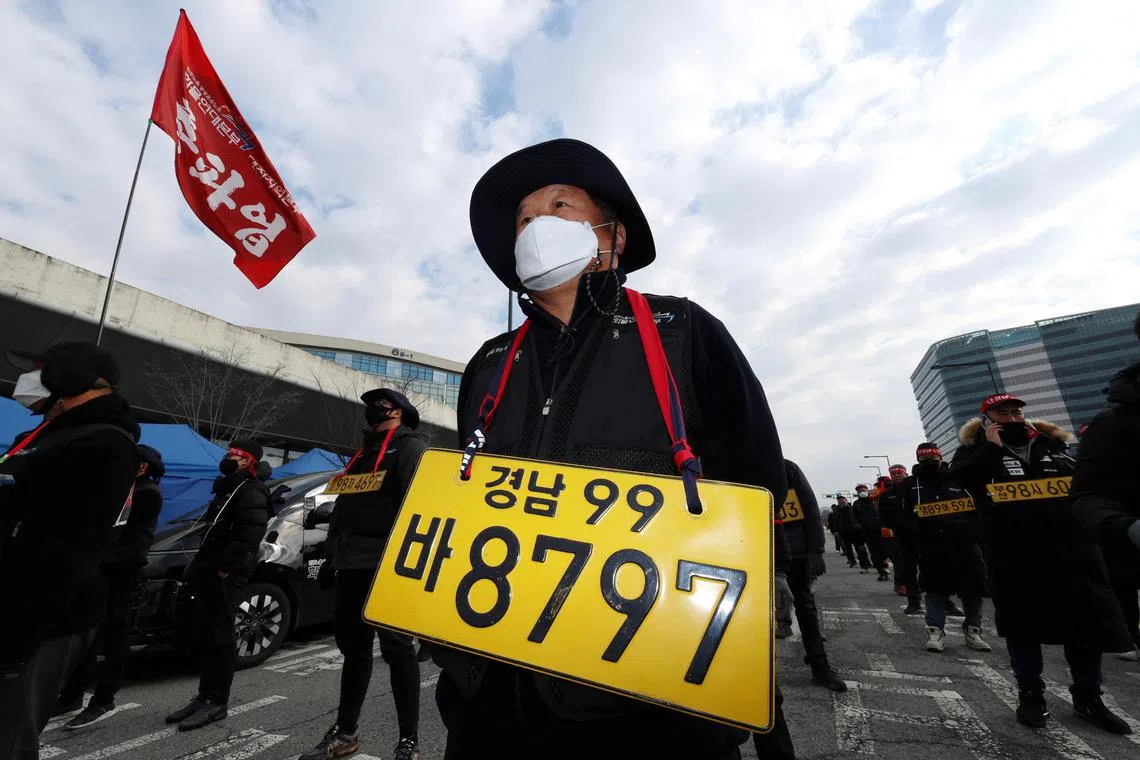South Korea orders striking steel, petrochem truckers to return to work
Sign up now: Get ST's newsletters delivered to your inbox

Unionised truckers attend a rally during their strike in Sejong, South Korea, on Dec 7, 2022.
PHOTO: REUTERS
Follow topic:
SEOUL – South Korea has ordered striking truckers in the steel and petrochemical industries to return to work on Thursday, widening a back-to-work order beyond the cement industry amid a prolonged nationwide truckers’ strike.
During opening remarks at a televised meeting of the country’s Cabinet, Prime Minister Han Duck-soo said he is issuing orders requiring the striking workers to return to work.
Tens of thousands of striking truckers are demanding a minimum wage programme be permanent and broader. The government has so far refused, but has said it can extend it beyond the current three years.
The Democratic Party, an opposition party that holds a majority in Parliament, has decided to support the government’s extension proposal, according to media reports.
Mr Han said: “The government remains steadfast. We absolutely have to break the vicious circle of an unjustified organised act.”
A senior union official said that no more negotiation sessions have been planned.
The government said earlier this week that the second strike in less than six months over minimum wage protections has, in its first 12 days, delayed the delivery of goods worth 3.5 trillion won (S$3.6 billion).
About 35 per cent of 2,600 fuel tanker drivers across the country are striking, media reports have said, citing the industry ministry.
As at Wednesday afternoon, 78 petrol stations had run out of fuel nationwide, many of which were in the Seoul metropolitan region, according to government data.
The “start work” order in November was the first time the government forced striking workers back on the job.
Failure to comply can lead to cancellation of licences, three years in jail or a fine of up to 30 million won.
Last week, the government issued a “start work” order to force 2,500 striking drivers in the cement industry back on the road.
Steel shipments are running at 48 per cent of normal levels, and shipments of petrochemical products have fallen to about 20 per cent, the transport ministry said on Thursday, raising concerns that those disruptions would hurt production of cars and ships.
Petrochemical companies are considering cutting production as early as this coming weekend because of shortages of raw materials and space for unused inventory.
Suffering from soaring fuel costs, as many as 25,000 striking truckers are calling for a temporary minimum-pay scheme for their industry to be made permanent.
The government has said its order has been effective in getting striking truckers back on the road, but the union said it will take legal action with the help of certified labour attorneys to defy the order.
On Wednesday, some said loss of income in the strike was becoming difficult for drivers to bear.
“Every one of us made enormous efforts to stop our trucks,” Mr Lee Sung-chul, a striking cement trailer driver, told a meeting organised by an MP on Wednesday.
“But the strike has gone on for more than 10 days. Given family finances and car instalments, some non-union drivers have started work again,” said Mr Lee, himself getting calls from his nervous wife to return to work. REUTERS

